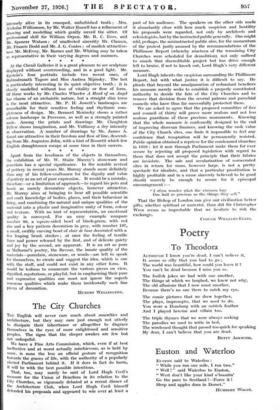The City Churches
TILE English will never care much about amenities and architecture, but they may care just enough not utterly to dissipate their inheritance or altogether to disgrace themselves in the eyes of more enlightened and sensitive peoples. The signs that the sleeper awakes are few but not unhopeful.
We have a Fine Arts Commission, which, even if at best ineffective and at worst actually mischievous, as is held by same, is none the less an official gesture of recognition towards the graces of life, with the authority of a popularly elected Parliament behind it. If it does in fact do harm, it will be with the best possible intentions. That, too, may surely be said of Lord Hugh Cecil's measure for the Union of Benefices in its relation to the City Churches, so vigorously debated at a recent dinner of the Architecture Club, when Lord Hugh Cecil himself defended his proposals and appeared to win over at least a part of his audience. The speakers on the other side made it abundantly clear with how much suspicion and hostility his proposals were regarded, not only by architects and eclesiologists, but by the instructed public generally. One might add, perhaps, the misinstructed public also, for the momentum of the protest justly aroused by the recommendations of the Phillimore Report (whereby nineteen of the remaining City Churches were scheduled for demolition), not only sufficed to smash that discreditable project but has drive enough left to bruise, if not to knock out, Lord Hugh's very different measure.
Lord Hugh inherits the suspicion surrounding the Phillimore Report, but with what justice it is difficult to say. He pleads that beyond the amalgamation of redundant benefices his measure merely seeks to establish a properly constituted authority to decide the fate of the City Churches and to remove that decision from the several patrons and parochial councils who have thus far successfully protected them.
We are asked to agree that the proposed committee of five and council of thirty will prove more zealous and not less zealous guardians of these precious monuments. Knowing that the whole measure is confessedly designed to the end of improving diocesan finances, and knowing the cash value of the City Church sites, one finds it impossible to feel any confidence that temptation will be permanently resisted. Public opinion obtained a reprieve for the condemned churches in 1919 ; let it now through Parliament make them for ever secure by rejecting all proposed legislation with regard to them that does not accept the principle that their fabrics are inviolate. The sale and secularization of consecrated sites in return for sums, however large, is not a pretty spectacle for idealists, and that a particular prostitution is highly profitable and in a cause sincerely believed to be good should scarcely be enough to secure for it episcopal encouragement :—
" I Often wonder what the vintners buy One.half so precious As the..things they sell."
That the Bishop of London can give our civilization better gifts, whether spiritual or material, than did Sir Christopher Wren seems so improbable that we hesitate to risk the exchange.
CLOUGH WILLIAMS-ELLIS.


















































 Previous page
Previous page